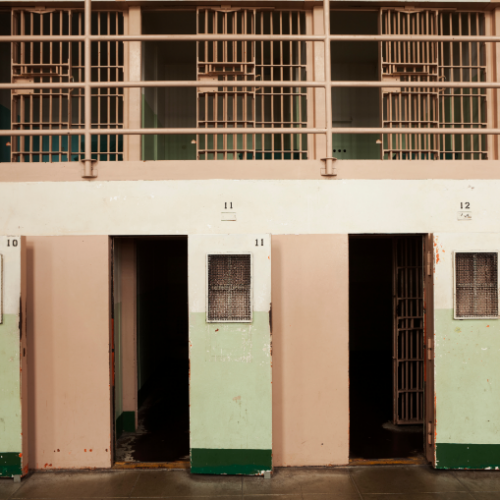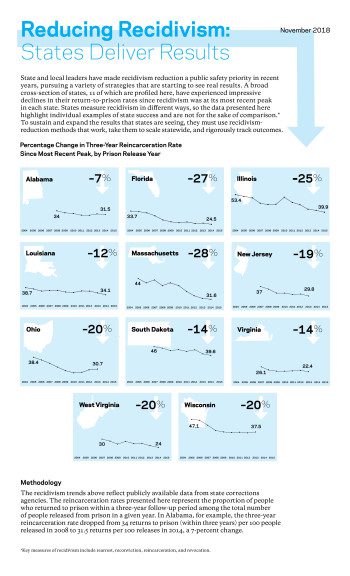Reducing Recidivism: States Deliver Results (2018)
Reducing Recidivism: States Deliver Results from the National Reentry Resource Center and the CSG Justice Center profiles 11 states that have experienced impressive declines in their return-to-prison rates since recidivism was at its most recent peak in each state. Using the most up-to-date data from Alabama, Florida, Illinois, Louisiana, Massachusetts, New Jersey, Ohio, South Dakota, Virginia, West Virginia, and Wisconsin, the infographic highlights three-year reincarceration rates as reported by state corrections agencies. It also details how Second Chance Act grant awards have helped the 11 featured states to test recidivism-reduction strategies, invest in evidence-based practices, and increase the capacity and scale of programs. Since 2009, the Second Chance Act has provided more than 900 grants across 49 states, impacting more than 160,000 people. Those people and programs are highlighted in Reentry Matters: Strategies and Successes of Second Chance Act Grantees, another publication from the National Reentry Resource Center and the CSG Justice Center. The brief highlights 21 stories from programs across 19 states, all of which are funded by the Second Chance Act.
A positive school experience, where a child feels secure, is essential for their well-being. However, for many children…
Read MoreWhen returning to their communities from criminal justice settings, people with behavioral health needs face barriers in accessing…
Read More Supporting Children of Incarcerated Parents: Reimagining School and Community Collaboration
Supporting Children of Incarcerated Parents: Reimagining School and Community Collaboration
A positive school experience, where a child feels secure, is essential for their well-being. However, for many children with incarcerated parents—one in 14 in the U.S.—school can feel far from safe due to stigma, trauma, and a lack of understanding.
Read More Bridging Communities and Correctional Systems: Q&A with CSG Justice Center Advisory Board Member Commissioner Nicholas Deml
Read More
Bridging Communities and Correctional Systems: Q&A with CSG Justice Center Advisory Board Member Commissioner Nicholas Deml
Read More
 Assigned to the Cloud Crew: The National Incarceration Association’s Hybrid Case Management for People with Behavioral Health Needs
Assigned to the Cloud Crew: The National Incarceration Association’s Hybrid Case Management for People with Behavioral Health Needs
When returning to their communities from criminal justice settings, people with behavioral health needs face barriers in accessing basic needs—including food, housing, employment, transportation, education, clothing, and substance use and mental health services—which increases their risk of experiencing a crisis.
Read More Meet the Medicaid and Corrections Policy Academy Mentor States
Meet the Medicaid and Corrections Policy Academy Mentor States
New Hampshire Department of Corrections Commissioner Helen Hanks presents at the Medicaid and Corrections Policy Academy in-person meeting.
Read More Taking the HEAT Out of Campus Crises: A Proactive Approach to College Safety
Taking the HEAT Out of Campus Crises: A Proactive Approach to College Safety
The sharp rise in school shootings over the past 25 years has led school officials across the U.S. to take a closer look at ways to keep students safe. For Chaffey College in Rancho Cucamonga, California, a tragic incident at a nearby university hit close to home and spurred campus leaders to revisit their own school’s threat assessments and crisis responses.
Read More











